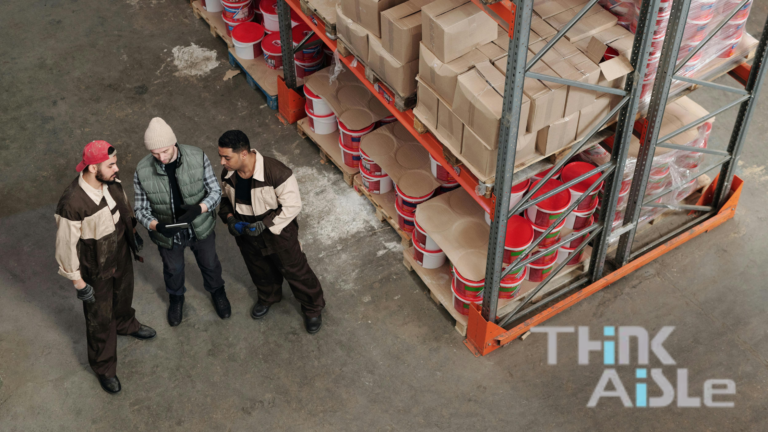With explicit policies and processes, warehouse management is an outstanding way to ensure efficient operations of warehouses or distribution centers. When a warehouse runs smoothly, it warrants a successful supply chain. However, warehouse management isn’t as easy as it may seem.
A thriving warehouse requires thoughtful planning, a collaborative effort of workers and managers, and the most important of all, i.e., basic principles. Wondering what the basic principles of warehouse management are? Read through:
- Defining Goals and Objectives:
A warehouse management’s first principle should be defining its basic goals. Generally, the basic goal of a warehouse is to limit the operation costs while delivering good quality services. To define your warehouse goals/purpose, start by jotting down:
- The reason behind the warehouse’s existence
- Serving market
- The expected lifespan of the warehouse facility
- Stock varieties it holds
- The area where it’s made
- Delivery requirements
You can create your objectives/purpose section by answering the above questions. In general, there are some common purposes of all warehouse management:
Adequate Resource Availability: The warehouse should have all kinds of materials/resources so that the production house does not face any crisis.
Reducing the Wastage or Loss of Goods: You should aim to track the available stocks to prevent their loss. These instances are quite common during godown storages and production plants.
Cost-efficiency: You should also aim to maintain cost-efficiency by predetermining the stock needs and eliminating additional stock storage.
A well-defined objective keeps all the warehouse members on the same path. It also maintains the optimal organization of the workforce and guaranteed stock access whenever necessary. Additionally, it prevents any confusion when there is mismanagement or problems concerning budget, time, or resources.
- Warehouse Safety (Data and Products):
For efficient warehouse management, all your warehouse data and inventories should be safe. That’s because it’s one of the most crucial aspects of warehouse management. Any loss of data, unintended leaks, or damages can turn into a drawback for your warehouse.
You can suffer problems like stock losses, miscalculations, or secret information disclosure. Keep track of the following dangers and pre-decide your mitigation measures accordingly:
Burglary and Theft: Warehouses are always well-stocked with inventories, and that’s why they are always at risk of burglary and theft. Besides, you need to be extra cautious if the stocks are high-value. You should always monitor potential internal and external threats to keep any potential burglar attacks at bay.
Hackers and Cyber Attacks: Warehouses are also at risk of malware attacks, supply chain breaches, and data leaks. From malicious competitors to hackers, various people can disclose sensitive or personal data from the storage. To prevent the same, always create cyber security policies, manage passwords, backup databases, and use antivirus softwares/firewalls.
Proper Handling: Besides considering technical or in-house security, warehouses should also handle hazardous substances precisely. They should be labeled, segregated, managed, dispensed, and disposed of as per the law. There should be regular safety inspections to ensure everything is going on the right track.
Natural Calamities: Always be prepared for fire outbreaks and natural calamities like floods. Make sure to install fire doors, fire suppression systems, smoke alarms, and fire extinguishers for warehouse fire mitigations. Stay assured of any flood warnings and conduct a recurrent flood risk assessment.
- Skilled and Trained Warehouse Workforce:
A warehouse workforce should be adequately staffed with a proficient warehouse workforce. That’s because warehouse employees are an eternal part of the team.
From managing goods to ensuring their effortless movement, their tasks are quite significant. So, their proper training is mandatory. If you are hiring a proficient warehouse worker, look for the following skills:
Fitness and strength: The worker should maintain a moderate level of fitness as there are diverse tasks to cover.
Literacy of the worker: They should be able to read and follow the instructions for the warehouse work. As their job role also involves calculation, you should be considerate of numeracy too.
Hand-eye coordination: They should have adequate hand-eye coordination to ensure work accuracy and efficient equipment usage.
Teamwork and self-motivation: The workers should be able to work as a team and stay motivated throughout the process.
Other factors: If you are looking for an experienced individual, check their past work and proficiency. You should also look for their computer literacy and qualifications in the domain.
Alternatively, if you are hiring a fresher for your team, try to organize training programs and render them the proficiency that’s necessary. The aim should be to create a robust team that handles all situations while consistently delivering high-quality outcomes. Encourage them to be resilient and educate them on the dos and don’ts.
It’s important for the warehouse to be skillful as they are the heart of the company. If these aspects aren’t considered, your warehouse may be more susceptible to breakdowns, congestions, or accidents.
- Quick Sales Order Processing:
All the sales orders should be quickly and accurately processed to ensure customer-
satisfactory outcome. For that, the sales order should be listed correctly in the inventory in the first place. If they are lodged correctly, there wouldn’t be any trouble with order processing and deliveries.
Once the order gets processed fast and correctly, it will be delivered timely and maintain customer satisfaction. On-time deliveries are always the customer’s favorite. However, it’s important to be considerate of the accuracy as wrong deliveries are a big turn-off.
Try to implement useful practices like double-checking, so there is no room for errors. Make sure to train and habituate your employees to perform quick scrutinizing before the actual rollouts.
- Appropriate Warehouse Equipment
A warehouse should be well-stocked with the necessary equipment. It should also be used precisely to avoid any misspend or delays in work. Whenever buying any tools/equipment, you should always be considerate of the models. Look for something that does the job without making you spend extra money. Also, ensure that your warehouse is stocked with:
- Pallet racks
- Specialty racks
- Shelving
- Forklifts
- Pallet jacks
- Stretch wrap machines
- Hand trucks
- Packing tables, etc.
To Conclude
For good inventory management, following the above principles are important. But, to get the best results, always take help from professionals.
For example, at Think Aisle, we can customize an inventory management solution that follows relevant principles for warehouse management. They could help you grow in the business while following your pre-defined objectives.


